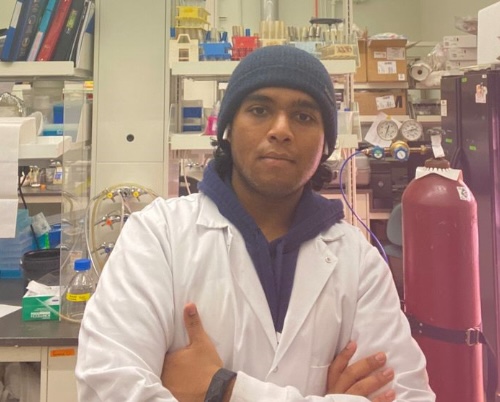Ibrahim Khodabocus receives Personnel Award for Black Scholars
16 February 2024

Ibrahim Khodabocus
Growing up in a household with a father with a PhD in organic chemistry who would occasionally bring his experiments home, Ibrahim Khodabocus’ fascination with science started very early.
“I was first mesmerized by science when I was 10 years old or so. My father would simply leave out a beaker of saturated copper (II) sulfate (aqueous) for all of the liquid to evaporate,” says Khodabocus. “When we revisited the beaker, a beautiful complex crystalline structure was left behind. Naturally, I didn’t understand the processes or mechanisms at play, but was in awe of the outcome all the same. As a child, I really wanted to be a scientist, which is quite wonderful since I now get to live that reality.”
This mesmerization with science led Khodabocus to the University of Alberta, where he is now pursuing his own PhD in medical sciences-pediatrics, studying neonatal sepsis and how this affects organ growth, dysfunction and energy metabolism. His work was recently recognized by Heart & Stroke, along with Brain Canada and the Canadian Institutes of Health Research-Institute of Circulatory and Respiratory Health (CIHR-ICRH), who named him as one of 19 recipients of the first-ever Personnel Awards for Black Scholars.
“It was both a surprise and an honour. I was absolutely elated as I wasn't expecting it! It affirms the importance of the work we are doing, which is encouraging,” says Khodabocus. “My father was the first person I told. He was all the way out in Kuwait, so I accidentally woke him up in the middle of the night. I simply couldn’t contain my excitement!”
Khodabocus was one of seven PhD students and 12 MSc students from across the country to receive the award, which was launched in 2023 with the goal of promoting Black representation in the heart and brain health research communities. It will provide financial support for 12 master’s students for up to two years and seven doctoral students for up to three years. Reducing financial barriers will allow outstanding students to focus on their studies, undertake a program of research and engage with mentors as part of their training and development.
“It will certainly help me establish an independent translational research program, later in my career,” Khodabocus says. “I’ve always been inspired by Muhammad Ali. He was a force for change and a prolific advocate for all persons. That’s something I strive to do as a scientist.”
The recognition also pleased Ibrahim’s PhD supervisor, Stephane Bourque.
“Ibrahim has always shown great tenacity in his pursuit of academic success. He is really deserving of this recognition among his peers,” says Bourque, an associate professor in the Department of Anesthesiology & Pain Medicine. “He is committed to a career as an independent investigator, and the prestige of this award will go a long way in helping him achieve that goal."
Khodabocus, who completed his undergraduate studies at Dalhousie University before moving to the U of A for graduate school, is thrilled to continue his research in an environment where he feels supported.
“The University of Alberta and its research are world class! This was my primary motivation for venturing out west,” Khodabocus says, “and I’ve really appreciated having Stephane as my supervisor. He has an open-door mentorship policy, whereby his trainees have virtually unfettered access to his expertise and advice with a simple door-knock. Indeed, I have gone to Stephane on several occasions to discuss data, experiment planning, my mentorship style or more personal matters. Stephane is always willing to lend an ear and disseminate advice, which is something that I try to do when I mentor more junior academics.”
Khodabocus is studying late-onset neonatal sepsis and how this affects organ growth, dysfunction and energy metabolism, something he is personally invested in.
“I have had people in my life who have contracted sepsis. They had to be resuscitated on several occasions, and very nearly succumbed to the disease,” says Khodabocus, who hopes to continue working in this area and eventually establish an independent translational research program. “Based on my past experiences, I simply cannot fathom a parent having to process that their child has contracted sepsis, therefore this project is deeply personal and meaningful to me.”
And having been born in Mauritius, raised in Kuwait, before moving to Halifax at age 15, Khodabocus is now settled in Edmonton.
“Having lived in Alberta for more than four years, I have really fallen for the province and its very rich culture,” he says. “It’s a great place to become a professional. This award affirms that.”
Jeremies Ibanga was the other U of A student to receive an award (you can read his story here).